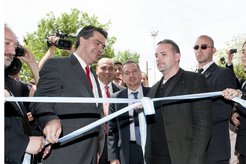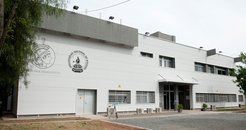New laboratory opened in Argentina
Work has started at the Max Planck Laboratory for Structural Biology, Chemistry and Molecular Biophysics of Rosario (MPLbioR)

The new laboratory was established in close cooperation with the Universidad Nacional de Rosario (UNR) and the Max Planck Institute for Biophysical Chemistry in Göttingen. It is located on the university campus in Rosario and has state-of-the-art facilities at its disposal. The research carried out at the laboratory aims to identify drug candidates for neurodegenerative diseases such as Alzheimer’s and Parkinson’s and to shed light on their structures.
With the help of the laboratory’s ultramodern magnetic resonance device, the strongest and most sensitive of its kind, the structure of biomolecules can be examined directly within the cell interior. Around 30 million Argentine pesos (circa 2.8 million euro) was invested in the building and its laboratory equipment and fittings.
Laboratory director is Claudio Fernández, an Argentine scientist who returned to his home country with the help of the Argentinian government Raices (Roots) programme. In the recent past Fernández was the Leader of a Research Group in the context of the Max Planck Society partner programme. Twenty-five scientists from the Argentinian state research association Conicet have already started working at the laboratory. The number of scientists employed there will increase to forty next year.

With its 1500 square metres, the building is the size of a small Max Planck institute.
Another of the laboratory’s key activities is the education and training of junior scientists. A binational doctoral course of study has been established between the universities of Rosario and Göttingen with the support of the Deutsch-Argentinischen Hochschulzentrums (German-Argentinian University Centre (CUAA/DAHZ). Göttingen Nobel laureate Stefan Hell has announced that he will give lectures there.
As part of the laboratory opening, a contract was signed between the company Nikon, USA, and the university, which contains plans for the establishment of an international Excellence Centre for microscopy at the Max Planck laboratory, the first of its kind in Latin America, and similar to existing centres in the USA and Europe.

